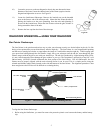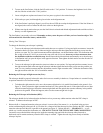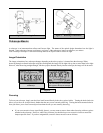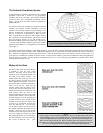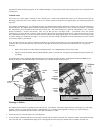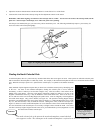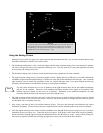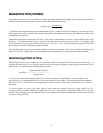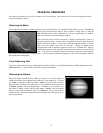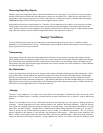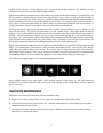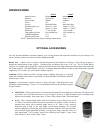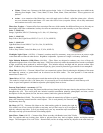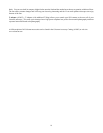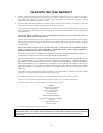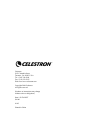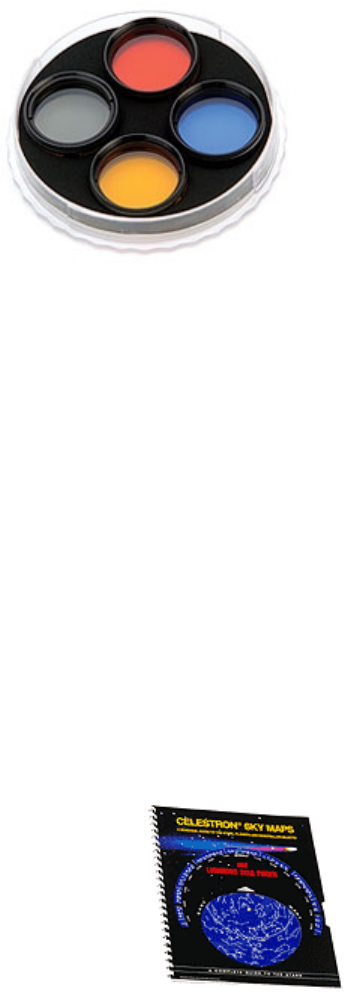
17
• Ultima - Ultima is our 5-element, wide field eyepiece design. In the 1-1/4" barrel diameter, they are available in the
following focal lengths: 5mm, 7.5mm, 10mm, 12.5mm, 18mm, 30mm, 35mm, and 42mm. These eyepieces are all
parfocal.
• Axiom – As an extension of the Ultima line, a new wide angle series is offered – called the Axiom series. All units
are seven element designs and feature a 70º extra wide field of view (except the 50mm). All are fully multicoated
and contain
all the features of the Ultimas.
Filters Sets, Eyepiece - Celestron offers four convenient filter sets, which contain four different filters per set. Not only are
these highly useful filter combinations, but they also offer an economical way to add versatility to your filter collection.
Series 1 – #94119-10
Orange, Light Blue, ND13%T, Polarizing (#s 21, 80A, #15, Polarizing)
Series 2 – #94119-20
Deep Yellow, Red, Light Green, ND25% T (#s 12, 25, 56, 96ND-25)
Series 3 – #94119-30
Light Red, Blue, Green, ND50% T (#s 23A, 38A, 58, 96ND-50)
Series 4 – #94119-40
Yellow, Deep Yellow, Violet, Pale Blue (#s 8, 47, 82A, 96ND-13)
Flashlight, Night Vision - (#93588) - Celestron’s premium model for astronomy, using two red LED's to preserve night
vision better than red filters or other devices. Brightness is adjustable. Operates on a single 9 volt battery (included).
Light Pollution Reduction (LPR) Filters (#94126A) - These filters are designed to enhance your views of deep sky
astronomical objects when viewed from urban areas. LPR Filters selectively reduce the transmission of certain wavelengths
of light, specifically those produced by artificial lights. This includes mercury and high and low pressure sodium vapor
lights. In addition, they also block unwanted natural light (sky glow) caused by neutral oxygen emission in our atmosphere.
Moon Filter (#94119-A) - Celestron’s Moon Filter is an economical eyepiece filter for reducing the brightness of the moon
and improving contrast, so greater detail can be observed on the lunar surface. The clear aperture is 21mm and the
transmission is about 18%.
Motor Drive (#93514) - Allows telescopes to track the motion of the sky once the telescope is polar aligned.
This model is a single axis (R.A.), DC motor drive. It is powered by two 9-volt alkaline batteries which lasts up to 40
hours. A speed rate regulator is included to adjust the speed slightly faster or slower.
Peterson First Guides® - Astronomy (#93728)
A simplified field guide to the stars, the planets and the universe featuring full color maps showing the positions of the stars
throughout the year. This useful guide also includes beautiful constellation paintings, photographs, and clear, concise
descriptions of stars, the planets, the sun, the moon, comets, black holes, galaxies and more.
Polarizing Filter Set (#93608) - The polarizing filter set limits the transmission of light to a specific
plane, thus increasing contrast between various objects. This is used primarily for terrestrial, lunar
and planetary observing.
Sky Maps (#93722) - Celestron Sky Maps are the ideal teaching guide for learning the night sky.
You wouldn’t set off on a road trip without a road map, and you don’t need to try to navigate the
night sky without a map either. Even if you already know your way around the major constellations,
these maps can help you locate all kinds of fascinating objects.
Solar Filters, 70mm (#94135) - Celestron Solar Filters are made with Baader Astro Solar™ Safety
Film. Far superior than any existing glass, Mylar or polymer filters, they lead to brighter, sharper, and higher contrast
images. The Sun appears in its “real ”color —neutral white, not blue or orange ,and the sky adjacent to the solar limb is jet



